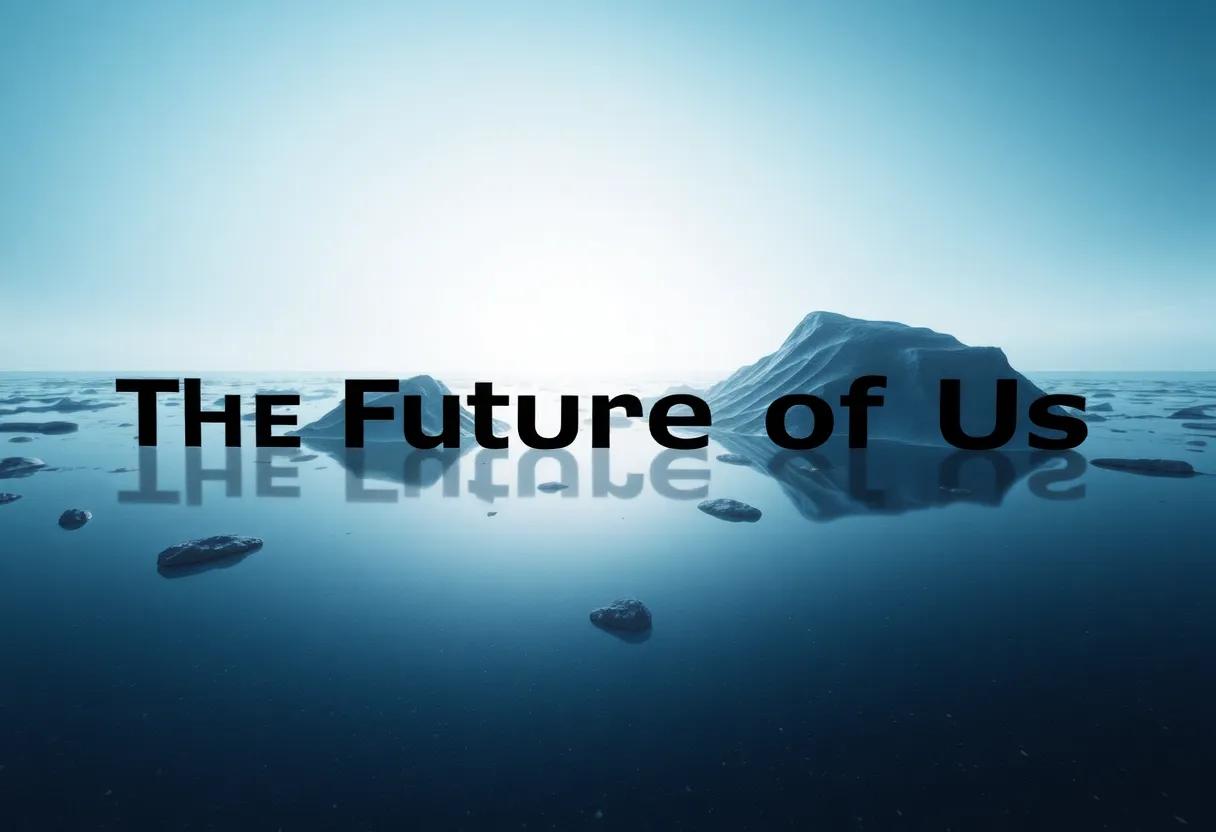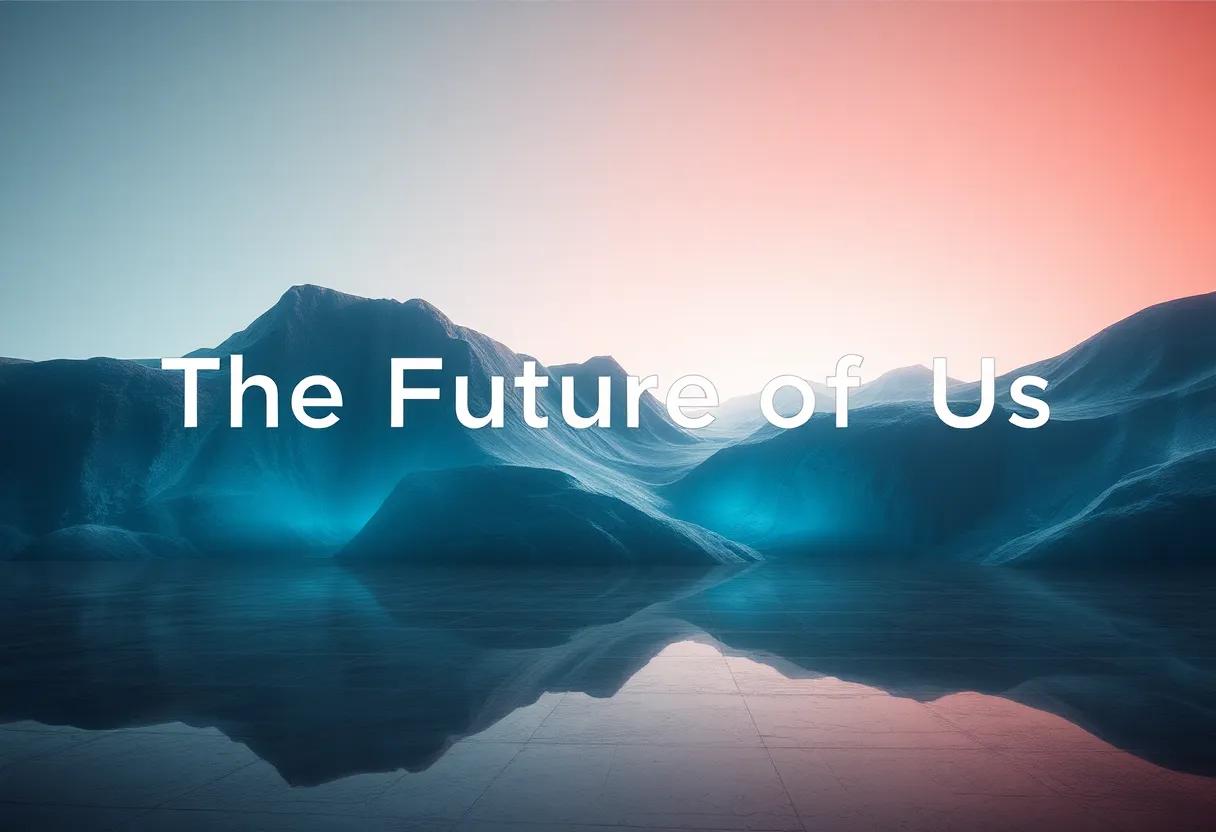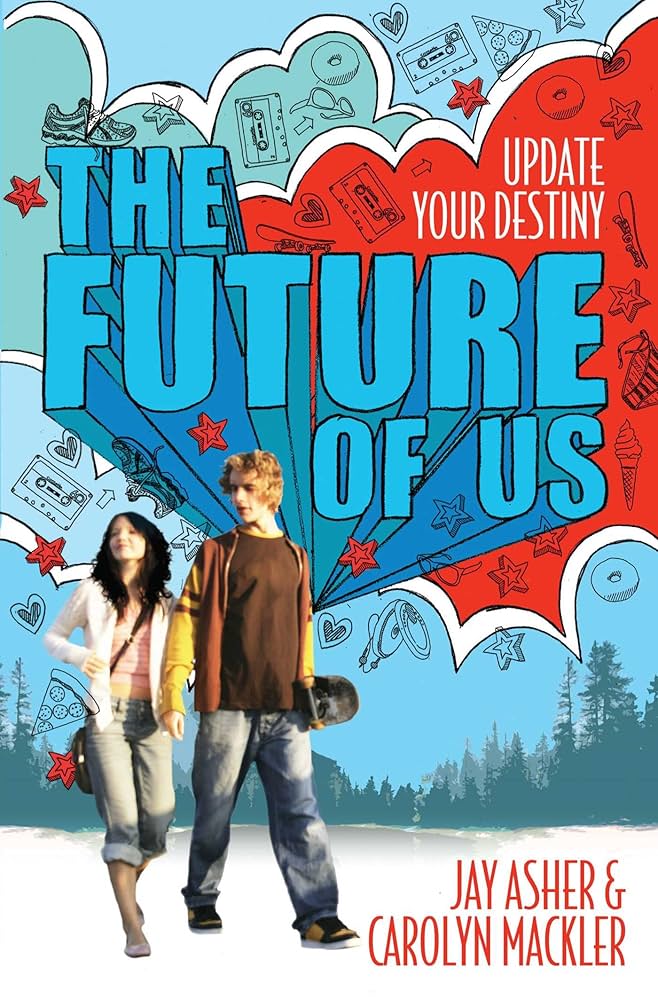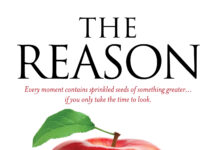In an era where technology and human connection dance an ever-evolving waltz, Jay Asher’s The Future of Us offers a poignant exploration of choices, consequences, and the tantalizing allure of knowing what lies ahead.Asher invites readers into a narrative that is as much about self-discovery as it is about the digital age’s impact on identity and relationships. This review delves beneath the surface of his compelling story, unveiling the layers that make The Future of Us a thought-provoking journey through time, hope, and the uncertainties that shape our tomorrows.
Exploring the Intriguing Premise Behind The Future of Us and How It Captures the Uncertainty of Youthful Choices

At the heart of The Future of Us lies a compelling concept that instantly intrigues: what if you could peer into your own future, unlocking the mysteries of the life you haven’t yet lived? Jay Asher delves into this alluring prospect with a sharp understanding of the precariousness of adolescent decisions. The narrative captures the essence of youthful uncertainty, painting a vivid portrait of two teenagers who stumble upon their Facebook profiles from 15 years ahead. This glimpse ignites a flood of questions-is their future predestined,or can today’s choices rewrite destiny? By intertwining the innocence of youth with the weight of potential outcomes,the story invites readers to ponder how every small decision might ripple through time.
The book’s brilliance also resides in how it mirrors the tumult of growing up through a modern lens. The characters navigate friendships, relationships, and self-identity while wrestling with the knowledge of their possible tomorrows.this tension manifests beautifully in moments that resonate deeply:
Best-Selling Books in This Category
- Hope and Doubt: The hope for a luminous future contrasts sharply with doubts seeded by the revelations on their screens.
- Choice Versus Fate: The struggle between seizing control and succumbing to a seemingly fixed path.
- The Weight of Awareness: How the knowledge of what *might* come affects present actions and emotions.
Inside the shaping of the characters’ journeys, the novel becomes a subtle meditation on growing pains, ambition, and the ever-shifting landscape of self-perception during adolescence.
A Deep Dive into the Characters’ Emotional Journeys and the Authenticity of Their Relationships Throughout the Story

The authenticity of Josh and Emma’s relationship stands as the story’s emotional core. rather than presenting a flawless romance,Asher exposes the complexities that come with growing up together,highlighting moments of miscommunication,fear,and genuine care.Their interactions serve as a mirror to real-life relationships, full of contradictions and evolving dynamics. Consider the table below, which outlines key emotional milestones that mark their journey:
| Milestone | Emotional impact | Relationship Insight |
|---|---|---|
| Discovering Their Facebook tomorrow | Shock and curiosity | Seeds doubt and hope |
| Facing Seemingly Inevitable Futures | Fear and frustration | Challenges trust and self-perception |
| Moments of Honest Communication | Relief and vulnerability | Builds connection and understanding |
| confronting the Unknown | Acceptance and courage | Strengthens bond and self-awareness |
Ultimately, the story’s emotional journey lies not in the certainty of fate, but in the power of choice and the honesty shared between two people navigating the shifting sands of adolescence and future dreams.
Unraveling the Role of Technology in Shaping Destiny and Its Impact on Personal Growth and Self-Discovery
Technology acts as both a mirror and a window-reflecting our deepest desires while simultaneously offering glimpses into potential futures.In The Future of Us, Asher explores this duality by illustrating how digital footprints serve as catalysts in the journey of personal evolution. As characters navigate the digital realm, their interactions with technology spark profound questions about identity, choice, and the seemingly predetermined paths shaped by the knowledge technology reveals. This raises compelling points about how external algorithms and internal introspection intertwine, pushing individuals toward growth and unexpected self-awareness.
Consider the dynamics of technology through these lenses:
- connectivity: Bridging gaps between present self and future possibilities, enabling an exploration of “what if?” scenarios.
- Reflection: Offering personalized insights that challenge existing beliefs and encourage introspection.
- Empowerment: Providing tools for self-discovery and the rewriting of one’s narrative.
| Aspect | Impact on Destiny | Effect on Personal Growth |
|---|---|---|
| Instant Awareness | alters life choices with early foresight | Promotes proactive self-reflection |
| Social Media | Shapes perception through shared experiences | Challenges authentic self-expression |
| Virtual Interactions | Creates option realities to test decisions | encourages empathy and adaptability |
Examining the Narrative Style and Pacing That Keep Readers Engaged While Balancing Introspection and plot Development
Jay Asher masterfully employs a narrative style that delicately weaves together moments of deep self-reflection with the forward momentum of the plot, ensuring readers remain captivated without feeling overwhelmed. The prose flows with an effortless rythm, using short, punchy sentences during high-stakes moments to accelerate the pace, while seamlessly transitioning into more contemplative passages that invite readers into the characters’ innermost thoughts. This balance allows for an immersive experience, where every action is underscored by genuine emotional weight and every revelation resonates with personal significance.
The pacing itself feels intuitive, never lingering too long on internal dialogues yet granting enough space to explore the complexities of time and choice. This keeps the narrative dynamic and engaging through:
- Strategic shifts between past and present perspectives
- Well-timed cliffhangers that tease the unfolding mystery
- Interspersed dialogues that humanize technology’s impact
| Technique | Effect |
|---|---|
| Alternating Points of View | creates layered understanding |
| Brief Flashbacks | Enhances emotional depth |
| Purposeful Pauses | Invites reader introspection |
Ultimately, the narrative’s delicate balance between introspection and plot progression is a testament to Asher’s keen understanding of storytelling, making the Future of Us a compelling journey that resonates long after the final page is turned.
Thematic Insights into Friendship, Love, and Ambition as Portrayed in The Future of Us and Their Real-World Resonance

The resonance of these themes transcends fiction, offering a mirror to the modern reader’s experience. Consider the emotional landscape:
- Friendship: evolving with external pressures and internal growth,reflecting today’s shifting social dynamics.
- Love: tested by time and circumstance,embodying the complexity of authentic connection.
- Ambition: balancing personal desires with ethical and relational considerations.
this thematic blend inspires a broader understanding of how human relationships are invariably intertwined with individual goals and unexpected changes-a dynamic increasingly relevant in a world where future possibilities can sometimes feel both tantalizing and daunting. To visualize this, here’s a snapshot contrasting fictional and real-world thematic elements:
| Theme | In The Future of Us | Real-World Resonance |
|---|---|---|
| Friendship | Fragile yet transformative; tested by time travel revelations | Evolving with life changes and digital distractions |
| Love | Complex, imperfect, and challenged by future knowledge | Requires ongoing effort amidst personal growth |
| Ambition | Driven by youthful dreams and fear of missed chances | Shaped by societal expectations and personal values |
How The Future of Us addresses the Complexity of Decision-Making and the Ripple Effect of Actions on Future Outcomes

Within the story’s fabric, the characters’ experiences reveal a nuanced understanding of cause and effect. Through their journeys, asher presents themes that resonate universally:
- Unpredictability: Even informed choices can lead to unexpected outcomes, underscoring the chaotic nature of life’s flow.
- Interconnectedness: Individual decisions don’t exist in isolation but influence larger systems,relationships,and personal growth trajectories.
- Obligation: Acknowledging the ripple effect generates a deeper awareness of accountability in shaping one’s own and others’ futures.
| Decision Type | Immediate Impact | Long-Term Ripple |
|---|---|---|
| Private Choices | Personal emotion shift | Altered relationship dynamics |
| Social Actions | Community reaction | Changed life trajectories |
| Unexpected Events | Temporary confusion | New opportunities or losses |
Visualizing Key Moments Through Vivid Imagery and Symbolism That Enhance the story’s Emotional Depth and Message

Jay Asher masterfully employs vivid imagery that lingers long after the last page is turned, drawing readers into the heart of every pivotal moment. from the flickering glow of computer screens symbolizing the fragile nature of technology and fate, to the contrasting seasons that mirror the characters’ evolving emotions, each scene is painted with intentional detail. These visuals do not merely set the stage; they act as emotional signposts, guiding the reader through the highs and lows of the protagonists’ journey.The recurring motif of light and shadow,as an exmaple,encapsulates the tension between hope and uncertainty,underscoring the novel’s central exploration of choice and consequence.
Symbolism deepens the narrative’s emotional impact, weaving layers of meaning that invite reflection long after reading. Objects like the vintage photograph or the timeless diary represent more than their physical form – they are anchors to the past and keys to understanding the present. This layered symbolism works in harmony with the story’s themes, enhancing the message that our futures are both shaped and revealed through the legacies we inherit and the decisions we dare to make. The following table highlights some of the key symbols and their narrative significance:
| Symbol | Portrayal | Emotional Resonance |
|---|---|---|
| Flickering Computer Screen | Uncertainty and technological influence | Fragility of future possibilities |
| Vintage Photograph | Connection to the past | Nostalgia and identity |
| Seasons Changing | Passage of time | Growth and transformation |
| Light and Shadow | Hope vs. Doubt | Conflict and resolution |
Balancing Optimism and Realism: A Critical Look at How the Novel Handles Hope in the Face of an Unpredictable Future
Jay Asher’s The Future of Us wrestles masterfully with the delicate equilibrium between optimistic aspiration and sober practicality. Rather than presenting hope as a blind force, the narrative challenges readers to acknowledge the fluidity of tomorrow, emphasizing that hope is not a static promise but a dynamic choice made in the face of uncertainty. The characters’ journeys exemplify this struggle-each choice they confront comes laden with potential disappointment yet is met with a resilient spark of possibility. This nuanced portrayal invites reflection on how we ourselves navigate the unknown,suggesting that hope flourishes not from denial of difficulty,but from courageous engagement with it.
Throughout the novel, several thematic elements underscore this balance:
- Unpredictability as an inherent factor: The story captivates with the awareness that the future can’t be predicted, urging humility in expectations.
- Hope grounded in action: Rather than passive wishful thinking, hope manifests through deliberate decisions and personal responsibility.
- Consequences of knowledge: The impact of seeing their future selves forces characters to reckon with choices and their ripple effects.
Consider the following simplified comparison of their emotional states before and after confronting their future:
| Emotional State | Before Knowing the Future | After Knowing the Future |
|---|---|---|
| Optimism | Bright but vague | Measured, cautiously hopeful |
| Realism | Naïve certainty | Hard-earned understanding |
| Agency | Passive anticipation | Active decision-making |
This interplay underscores the book’s critical exploration of how we forge hope-not as an escape from reality, but through our mindful, sometimes difficult reconciliation with it.
Why The Future of Us Appeals to Both Young Adult Readers and Adults Looking for Reflective, Thoughtful Narratives
The Future of Us masterfully bridges the gap between youthful discovery and mature introspection, appealing to a wide audience by weaving worldwide themes of identity, choice, and consequence. Jay Asher and Carolyn Mackler craft characters and scenarios that resonate deeply with young adults navigating the complexities of growing up, while simultaneously offering adults a reflective lens through which to examine their own past decisions and future uncertainties. The novel’s unique premise-viewing one’s own future through the lens of today’s actions-encourages readers to ponder not only what lies ahead, but also how the present moment shapes that path. This dual appeal stems from its ability to balance relatable adolescent experiences with profound philosophical questions,making it equally compelling for both demographics.
Beyond its narrative, the book’s layered storytelling invites readers to engage with themes that transcend age, such as the impact of technology on human connection, the volatility of relationships, and the enduring quest for self-understanding. These motifs are presented thoughtfully, prompting readers to reflect on their own lives in meaningful ways. Consider the table below, which summarizes key thematic elements and how they resonate differently with young adults versus adult readers:
| Thematic Element | Youthful Perspective | adult Reflection |
|---|---|---|
| Choices and Consequences | Excitement and uncertainty about defining moments | Regret, acceptance, and reevaluation of past decisions |
| Technology’s Role | Novelty and exploration of digital identity | Concern over lasting impacts on relationships |
| Relationship Dynamics | First loves and friendships in flux | Long-term relational patterns and emotional growth |
| Self-Discovery | Forming personal values and ambitions | Reflection on life’s purpose and authenticity |
This intricate balance makes The Future of Us not just a story about coming of age, but also a mirror for all readers seeking a thoughtful exploration of how our present selves shape the tomorrows we imagine.
Recommendations for Readers Who Appreciate Character-Driven Stories Set Against a Backdrop of Technology and Tomorrow
For those captivated by narratives where human emotions intertwine seamlessly with the relentless march of innovation, there’s a treasure trove of stories waiting to be uncovered.These tales don’t just showcase technology as a backdrop but elevate it to a character in its own right-shaping destinies and challenging identities. If The future of Us resonated with you, consider immersing yourself in works that reveal how characters navigate the moral and emotional labyrinths of tomorrow’s world.
- Neal Stephenson’s Anathem – A philosophical journey where intellectual societies grapple with cosmic mysteries and advanced tech.
- Rainbow Rowell’s Fangirl – Although less sci-fi, it highlights personal growth in a digitally connected world.
- Andy Weir’s The Martian – A gripping survival story underscored by human ingenuity and futuristic problem-solving.
For those who appreciate detailed explorations of characters’ inner lives amid technological revolutions,the balance between emotion and innovation is paramount. Below is a simple guide to help you decide which novel might best satisfy your craving for thought-provoking, character-driven futures:
| Book | Focus | Why You’ll Like It |
|---|---|---|
| The Circle by Dave Eggers | Surveillance & ethics | Explores personal integrity in a hyper-connected world |
| station Eleven by Emily St. John Mandel | Post-apocalyptic art & humanity | Captures the resilience of human spirit amid collapse |
| Ready Player one by Ernest Cline | Virtual reality & identity | Blends nostalgia with futuristic escapism |
The Future of Us Compared to Other Contemporary Young Adult Novels exploring Time, Identity, and Change
Jay Asher’s The Future of Us stands out among its contemporaries by weaving the intricate threads of time and self-discovery through the lens of modern technology. Unlike other novels that rely solely on fantastical elements or dystopian futures, Asher cleverly incorporates the real-world anxieties of adolescence with the digital age’s unpredictable impact. The narrative delves deeply into how seeing one’s future online can unsettle the foundation of present identity, forcing characters-and readers-to question the boundaries between fate and free will. This juxtaposition of timeless themes with contemporary relevance breathes fresh life into familiar territory.
Compared to other young adult novels exploring similar themes, The Future of Us emphasizes:
- Emotional authenticity: The characters’ reactions to discovering their futures are raw and relatable, avoiding clichéd horrification or blind acceptance.
- Technological integration: The plot hinges on the early days of social media, making it resonate with a generation growing up in a rapidly evolving digital landscape.
- Subtle exploration of change: Rather than presenting change as radical or revolutionary, it shows how small decisions ripple through time, shaping identity in profound ways.
| Novel | Approach to Time | Focus on Identity | Portrayal of Change |
|---|---|---|---|
| The Future of Us | Digital flash-forward | Emotional introspection | Subtle, ripple effect |
| Before I Fall | Groundhog day loop | Self-redemption | Radical, personal transformation |
| Time Between Us | Time travel romance | Love and belonging | Disruptive, life-altering |
Insights into Jay Asher’s Writing Style and how It Evolves to Address Complex Themes with Subtlety and Impact

Jay Asher’s narrative voice has always been marked by its clarity and emotional resonance, but in The Future of Us, he deftly layers complexity beneath his accessible prose. His writing seamlessly intertwines nostalgia with the uncertainties of adolescence, employing a style that is both straightforward and evocative. Through carefully crafted dialogue and vivid,relatable scenarios,Asher explores weighty themes such as destiny,choice,and the consequences of our actions without overwhelming the reader. This subtlety allows the emotional core of the story to shine, illustrating how even small decisions ripple into the future with profound impact.
What sets this work apart is the evolution in Asher’s thematic exploration, where he moves beyond personal dilemmas to touch upon broader societal questions.His use of dual timelines and shifting perspectives invites readers to actively engage with the unfolding narrative, encouraging introspection about technology’s influence and the human desire for control. The following table exemplifies the key elements Asher employs to balance complexity with readability:
| Writing Element | Description | Impact |
|---|---|---|
| Character-driven narrative | Focus on authentic, flawed adolescents | Creates relatable emotional depth |
| Subtle foreshadowing | Hints at consequences without overt exposition | Builds suspense and reader investment |
| Balanced pacing | Merges introspection with plot advancement | Maintains engagement while exploring themes |
| Dual timeline structure | Contrasts past choices with future outcomes | enhances thematic richness and complexity |
Reflecting on The Future of Us as an Inspirational Yet Cautious Exploration of Life’s Uncharted Possibilities

In an age where technology relentlessly propels us forward, The Future of Us delicately balances the allure of possibility with the sobering realities of choice. Through the characters’ journey, readers are gently invited to consider how foresight can both illuminate and complicate the paths we take.The novel’s portrayal of time-traveling insights serves as a metaphor for introspection, reminding us that every decision carries a ripple effect-shaping not only our future but our sense of self.
The narrative’s depth is enhanced by its ability to explore complex themes without overwhelming optimism or cynical resignation. key reflections emerge in moments like:
- The paradox of knowledge: How knowing too much about tomorrow could freeze the spontaneity of today.
- the fragility of relationships: Highlighting how connection requires presence, not just certainty about what lies ahead.
- Hope tempered by realism: Encouraging us to dream while remaining anchored to practical wisdom.
| Aspect | Inspirational Element | Cautious Reflection |
|---|---|---|
| Time Insight | Motivates change and growth | risk of paralysis by overanalysis |
| relationships | Celebrate bonds that inspire | Fragility when future looms too large |
| Choices | Empowerment through self-determination | Burden of unintended consequences |
About Jay Asher The Author Behind The Future of Us and His Journey From Bestselling Novelist to Thoughtful Storyteller
jay Asher is widely recognized for his ability to weave compelling narratives that resonate with readers across generations. Known primarily for his groundbreaking debut, Thirteen Reasons Why, Asher has consistently demonstrated a keen insight into the complexities of human emotions and relationships. his journey from bestselling novelist to thoughtful storyteller reflects a dedication to exploring nuanced themes through accessible, relatable characters. The evolution of his craft is marked by a deliberate shift toward stories that not only entertain but also provoke reflection about the impact of our choices and the unpredictable paths of the future.
in crafting his latest work, Asher embraces a narrative style that invites readers to ponder the delicate balance between destiny and free will.His unique approach incorporates elements that appeal to thoughtful readers, including:
- Multidimensional characters grappling with realistic dilemmas
- A poignant exploration of technology’s influence on human connections
- Engaging timelines that challenge perceptions of cause and effect
These elements come together in a seamless blend of perspective and prose, contributing to a storytelling experience that is both meaningful and immersive.
| milestone | Impact |
|---|---|
| Debut Novel (2007) | Established a voice for young adult issues |
| The Future of Us (2011) | Expanded themes to technological influence on youth |
| Recent Works | Focus on introspective,character-driven narratives |
In unraveling the layers of The Future of Us,Jay Asher invites readers to venture beyond the pages and ponder the delicate dance between destiny and choice. This thoughtful exploration not only captivates with its compelling narrative but also leaves us lingering on the possibilities that lie ahead-for characters and readers alike. Whether you seek a nostalgic glance at youth or a mirror reflecting your own uncertainties about tomorrow, Asher’s work offers a quietly resonant journey, one that gently reminds us: the future is often what we make of it.













